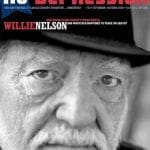Jason Ringenberg – A reckless country’s soul
So, OK, here’s how it happened.
Jason Ringenberg is on a train traveling through central Germany. It’s not unusual that he should be here; he’s in the middle of one of five tours of Europe he’ll make in support of his 2002 CD, All Over Creation. Tonight, in some town, in this region he likes a lot, there will be another one of his unpredictable, spontaneous shows, in that exuberant, friendly, hellzapoppin’ mode for which he’s been known for a generation, another of over 300 dates that have taken him into 2003.
Very likely he’s toying, in his head, with some new song, maybe even one of those that turns up on his new CD; he’s been writing on the road pretty constantly lately, since his daughters have gotten old enough to want him dedicated to pushing them on the swings whenever he’s home, not off in some room writing.
So this train comes around a bend, high on a mountain, and Jason is peering down into the valley below, where there’s this attractive Bavarian-style barn, all red with nice white trim, and with a little cupola on top. And on top of that little cupola waves — the Stars and Bars. It’s the biggest Confederate flag he’s ever seen, and he’s spent a whole lot of time in the American south.
An American stationed overseas with barn roof access? A German youth who’d found this an inviting 21st-century symbol? What the hell?
“I was in shock,” Ringenberg recounts now. “I used the Lord’s name in vain, despite the commandment: ‘Goddamnit; what is this?’ I almost fainted! I said that out loud and all the Germans were looking at me. I think they were a little uncomfortable about the whole situation. I had my cowboy hat on the whole time, and they probably thought I was cheering, rebel style: ‘Yes, we won! We may have lost that war in America, but we’ve won it in Germany, by Gawd!'”
That image, and the feeling of that ambiguous, provoking, history-laden moment, lies behind one standout song on Ringenberg’s new album, Empire Builders (due out September 7 on Yep Roc Records). “Rebel Flag In Germany” is part of a song-cycle that reflects the contemplation of a concerned American traveling abroad as the war in Iraq was debated, ramping up, commencing, then changing international relations, even at the personal level.
The songs — most of a pointed, explicitly political nature not particularly associated with the music of the Jason & the Scorchers founder previously — look at the United States and its policies with some of that “written from overseas” remove; yet they reflect Ringenberg’s deep connection to his home, and his affection for it, in their every beat and lyrical utterance. Wrestling with policies he finds intolerable from such a deeply rooted position has produced a set of political songs with an unusual degree of nuance and “on the other hand” breadth (originals mostly, plus several more adopted as right for the set).
“In the more overt political songs, like the opener ‘American Question’ and the closing song ‘American Reprieve’,” Ringenberg says, “I am asking questions about where America is going in the foreign policy matrix that we’ve built up, and trends that Americans have had to deal with since World War II — whether we’re on the right track.
“Personally, I don’t know all the answers to those questions — and I didn’t just want to make some anti-Bush, pro-John Kerry record; that was not my purpose. I wanted to talk about the long-term effects of our foreign policy, and a military-industrial establishment way out of control. I’m not the first American to raise that. One of the most credible, and first, was Dwight Eisenhower — and this was a military man saying it.”
The nature of the broad-brush anti-Americanism that Ringenberg continuously encountered on tour last year has clearly affected his views about the sort of American he doesn’t hesitate to call, on one in-your-face new number, the “New-Fashioned Imperialist”; he puts that perpetrator in context.
“I’m a very obvious sort of stereotype for some Europeans myself, an open target,” he admits. “They see the cowboy hat and boots and the jeans and they think that I must be a certain type of American. ‘There he is! One of those evil American cowboys, right there!’ So I was usually starting from a position of antagonism; a lot of people wanted to beat me up because ‘I’ started the war!
“So while I was, and am, and will be, completely against the war in Iraq, traveling around the world, it also bothered me profoundly when people would say things like, ‘George Bush is worse than Hitler!’ The slogans were just not doing anybody any good, or bringing any sort of constructive healing and new options to the process.”
A generation ago, as the Vietnam War heated up, the celebrated 1966 tour of Bob Dylan & the Hawks took that contingent to France, where Dylan was taken aback to find himself being praised for being presumptively “anti-American.” The response, documented on film, was an appearance in Paris performing “Desolation Row” and “Like A Rolling Stone”, just that one time, in front of an immense American flag.




